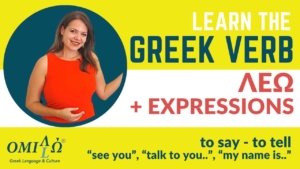The Greek Expressions for “See you” or “We will see” are used on a daily basis, but….
Don’t mix them up in Greek!
Ever had that awkward moment when you confidently say something in Greek… and your Greek friend gives you that look?
Yeah — we’ve all been there.
Today’s Greek lesson is all about two tiny expressions that sound similar but mean totally different things.
They’re both super common, and if you’re visiting Greece, you’ll hear them all the time.
But warning: mixing them up is a classic Greek learner’s blooper! Let’s fix that today
So, picture this:
You just had an amazing coffee (or two) with your fabulous Greek friends
The sun is shining, life is good, and it’s time to say goodbye.
You go in for the friendly kisses, wave goodbye, and then proudly say:
“Θα δούμε!”
Oops. Not quite.
You thought you were saying “See you!” — but what you actually said was…
“We will see…”
Like, maybe, perhaps, who knows, we’ll see what happens in life…
(Not really the goodbye vibe you were going for.)
The expression you meant to say is:
“Τα λέμε!”
Literal translation: “We talk”
But in real life, it simply means: “See you!”
Τα λέμε αύριο! → See you tomorrow!
Τα λέμε σύντομα! → See you soon!
Easy. No deep grammar required. Just remember it by heart.
Or read below for more explanations
1) “See you” = Ta leme – Τα λέμε
Let’s break it down, Greek-style
Greeks love to talk.
They talk in person, over the phone, at the café, while crossing the street, in the supermarket… basically, if there’s an opportunity to chat, they’ll take it!
So when it’s time to say “See you,” what do they actually say?
“Τα λέμε!”
Literally: “We talk” or “We’ll talk.”
Yep — instead of saying “I’ll see you later,” Greeks say, “We’ll talk later!”
No need for the verb “to see” — just use the verb λέω (= to say / to talk).
Here’s how it works:
-
You take the present tense “we” form of λέω → λέμε (= we talk)
-
Then add a little “τα” in front (which refers to “the things” we’ll talk about)
Τα λέμε!
A few handy examples to sound like a local:
Τα λέμε μετά / αργότερα
= See you later / Talk to you later
Τα λέμε αύριο
= See you tomorrow / Talk to you tomorrow
(Throw in a friendly smile and a casual wave, and you’re basically Greek now )
Bonus: A Greek song called “Τα λέμε!”
Of course, there’s a Greek song about it — because why not?
“Τα λέμε” is the title of a hit song by Eleonora Zouganeli, one of Greece’s most beloved female singers of the younger generation.
But spoiler alert — the lyrics are not exactly cheerful!
It’s about a guy who wants to break up with his girlfriend, but instead of saying “It’s over,” he just says “Τα λέμε!” and disappears like a ghost
The girl? She’s not buying it. She knows exactly what’s going on. Ouch.
Want to see the drama unfold and improve your listening skills?
Click here to watch the music video and listen to the song
Next up: What not to say when you mean “See you”…
Let’s look at that sneaky little phrase “Θα δούμε!”
(Stay tuned — or better yet, Τα λέμε σε λίγο!)
2) “See you” = Tha ta poume – Θα τα πούμε
click here to see the video lessons with teacher Myrto
3) “We will see” = Θα δούμε! (Tha doume)
Alright, let’s talk about “Θα δούμε” — the expression that sounds friendly, but secretly means: “…maybe, maybe not, let’s not commit to anything right now.”
As we said earlier, many Greek learners accidentally say this when they mean “See you” — but oops! This phrase doesn’t mean that at all.
So, what does “Θα δούμε” mean?
It comes from the verb βλέπω (= to see), and in this case, it’s in the future tense, “we will see.”
Sounds innocent, right? Well… not always!
✅ When to actually use “Θα δούμε”:
a) Literally – when you’re talking about watching something:
Απόψε θα δούμε μία ταινία στην τηλεόραση.
= Tonight we’ll watch a movie on TV.
Totally normal! No hidden meaning here.
Just a cozy evening and a film
And of course, “βλέπω” is a regular verb, so you can use it in all forms — not just “we.”
(We’ve got a free handout with the full conjugation — check it out below!)
b) Figuratively – when you’re avoiding a yes/no answer
Yup — “Θα δούμε” is the perfect Greek way to say:
“We’ll think about it.”
“Let’s see what happens.”
“Not sure. Maybe.”
“Please stop asking.” !! 🙂
Example:
Child: “Θα πάμε στο σινεμά απόψε;”
Parent: “Θα δούμε…”
(Translation: Probably not, but I’m dodging this conversation right now.)
Bonus cultural tip:
In Greece, “Θα δούμε” is a way of life!
You’ll hear it a lot.
It’s the go-to answer when someone:
-
Doesn’t want to commit
-
Needs more time to decide
-
Just doesn’t feel like saying “όχι” (no)
Want to master this verb?
Teacher Terpsi has got your back!
She’ll walk you through how to conjugate βλέπω in both present and future tense — with fun examples and zero stress.
++++++++++++++++++++++++++++
Quick Recap:
| Greek Expression | What it actually means | When to use it |
|---|---|---|
| Τα λέμε! | See you! | Say it at the end of a conversation, or when you are leaving |
| Θα δούμε! | We’ll see / Maybe | When you’re not sure about something |
So next time you’re waving goodbye to your Greek pals, avoid the drama of philosophical uncertainty and just go with:
“Τα λέμε!”
Your friends will smile, and you’ll sound like a total pro.
Καλό μάθημα και… τα λέμε σύντομα!
++++++++++++++++++++++++++++
Want more like this? Check out our Useful Verb eBook!
Did you find this lesson helpful?
Feeling a bit more confident with your Greek “see you” skills?
Well, that’s just the beginning!
If you’d like to dive deeper and get:
✅ More examples of everyday Greek verbs
✅ Useful phrases and real-life vocabulary
✅ Easy-to-follow conjugation tables
✅ And lots of tips to sound more like a local…
Then don’t miss our Greek Verb eBooks!
They’re packed with practical content that makes grammar way less scary — and actually kind of fun.
Click here to explore our grammar eBooks
Τα λέμε στο eBook!












